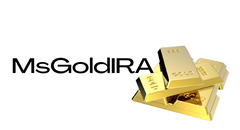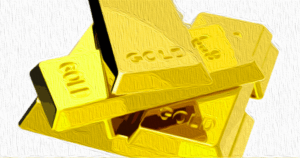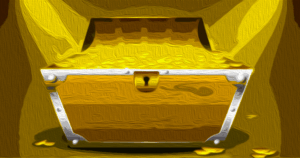
Recently, the correlation between Bitcoin and gold has been thrust into the spotlight, shedding light on an interesting dynamic between two popular alternatives for traditional fiat currency. Contrastingly, China’s relationship with gold is shifting as it leverages its assets to protect its currency. These concurrent trends illuminate an evolving narrative in the financial world. This article explores the connection linking Bitcoin, gold, and China, revealing the intriguing mechanics that govern these relationships.
Bitcoin Breaks Free from Gold
In the world of investments, Bitcoin and gold have long been paired due to their shared role as vehicles for hedging against inflation. For instance, gold currently presents a lower inflation rate of 1.7% compared to Bitcoin's 1.8%. This difference seems to shrink significantly during Bitcoin's halving, wherein the number of new bitcoins generated by the network's underlying blockchain halves. One might logically conclude that the two should fluctuate in tandem. However, reality displays a significant paradigm shift, with gold taking a beating as Bitcoin gains momentum.
Recently though, Bitcoin's performance has been outstripping that of gold. This decoupling has been particularly conspicuous over the past days, suggesting that gold might follow the moves of Bitcoin. Yet, contrary to expectations, gold appears to be crashing as Bitcoin bounces back.
A Glance at the Gold Market in China
An interesting factor arises when examining the divergent paths of Bitcoin and gold. The Chinese market is currently experiencing a dramatic fall in gold prices coupled with a surge in Bitcoin. This can be traced back to the Chinese preference to sell gold rather than their dollar reserves, to shield their currency and maintain their dollar FX reserves. This trend suggests the Chinese are contending with a dollar shortage, thus compelling them to mitigate the need for local banks to purchase dollars by lifting a quota they had on gold imports.
This decision significantly impacts global gold prices and contributes to Bitcoin's notable market activity. Considering that Chinese markets remain closed for the Mid-Autumn Festival and China’s National Day, the data serves as a significant market indicator given the established correlation between gold, bitcoin, and the Chinese Yuan (CNY).
Market-Based Inflation Expectations
In the face of these market dynamics, the U.S. debate continues to grapple with inflation and the risk of potential recession. This dichotomous scenario allows us to analyze inflation expectations in relation to recession risks.
Commonly used to gauge general inflation expectations, the 5y-5y Forward Contract and the 5 and 10-year breakevens currently forecast inflation to be less than 2.5%. While this median inflation expectation neither suggests a high nor low inflation expectancy, the market’s growing concern is evident. This pattern resembles the market uncertainty preceding both the Great Financial Crisis and the COVID-19 economic fallout, hinting that a recession might be on the horizon.
Bitcoin’s Role in the Recession-versus-Inflation Narrative
Amid this contemplation between a potential recession and a looming inflation, stagnant bank credit affirms the thesis of the 'recession-not inflation' prospect. This stagnancy hints at a likely deflationary outcome, which could benefit assets like Bitcoin that act as a hedge against systemic credit risk. In this scenario, Bitcoin, being free of counterparty risk, emerges as a strong alternative to credit-based financial assets.

The ongoing analysis adds incremental layers to this 'recession-not inflation' argument, suggesting that halting bank credit might pull down inflation expectations, causing a gradual decline in breakevens. If inflation expectations start to slide, a recession could ensue approximately 15 months later based on historical patterns.
Nevertheless, assets like stocks and Bitcoin, usually identified as risk assets, appear to thrive and increase in value in anticipation of a recession. Therefore, given the current market indicators, it can be anticipated that Bitcoin will continue to prosper through the halving and into the coming years.
Frequently Asked Questions
What are the pros & con's of a golden IRA?
The gold IRA is a great way to diversify your portfolio, but you don't have access the traditional banking services. It allows investors to invest in precious materials such as gold and silver without paying tax on gains until they are withdrawn.
There is a downside to this: if you withdraw your earnings early, you'll be subject to normal income tax. The funds are not located in the country and can be easily seized by creditors if your loan defaults.
A gold IRA might be the right choice for you if you enjoy owning gold and don't worry about taxes.
Can I store my gold IRA at home?
Online brokerage accounts are the best way for you to invest your money. You have all the investment options you'd get if you had a traditional broker. However, you don't require any licenses or qualifications. Plus, there are no fees for investing.
Online brokers often offer free tools to help manage your portfolio. They will even let you download charts to see how your investments perform.
How Do You Make a Withdrawal from a Precious Metal IRA?
If you have a precious IRA company such Goldco International Inc. account, you may be tempted to withdraw your funds. You can sell your metals at a higher price if they are still in the account than if you left them there.
Here are the steps to help you withdraw money from your precious-metal IRA.
First, you need to find out if the provider of your precious metal IRA allows withdrawals. Some companies offer this option while others do not.
Second, find out if you are eligible for tax-deferred gains from selling your metals. This benefit is offered by most IRA providers. However, some don't.
Third, you should check with the provider of your precious metal IRA to determine if there are fees for these steps. It is possible that the withdrawal will be more expensive.
Fourth, you should keep track of precious metal IRA investments for at minimum three years after they are sold. You should therefore wait until January each year to calculate capital losses on your investment portfolio. You will then need to file Form 8949 which contains instructions on how to calculate the amount of gain that you have realized.
The IRS requires that you report your sale of precious metals. This ensures you pay tax on any profits from your sales.
A trusted attorney or accountant should be consulted before you sell your precious metals. They can help you avoid costly mistakes and ensure you comply with all regulations.
Statistics
- If you accidentally make an improper transaction, the IRS will disallow it and count it as a withdrawal so that you would owe income tax on the item's value and, if you are younger than 59 ½, an additional 10% early withdrawal penalty. (forbes.com)
- SEP-IRA”Simplified employee pension” For self-employed people like independent contractors, freelancers, and small-business ownersSame tax rules as traditional IRASEP IRA contributions in 2022 are limited to 25% of compensation or $66,000, whichever is less4. (sltrib.com)
- Depending on your financial situation, most experts recommend you invest no more than 5% to 10% of your retirement funds in precious metals. (forbes.com)
- Same tax rules as traditional IRA SEP IRA contributions in 2022 are limited to 25% of compensation or $66,000, whichever is less Before setting up a Silver IRA, understand the fees and IRS restrictions. (sltrib.com)
External Links
forbes.com
takemetothesite.com
wsj.com
en.wikipedia.org
How To
Things to Remember about the Best Precious Metals Ira of 2022
Precious Metals Ira ranks high among investors as one of their most popular investment options. This article will provide information on how to understand the appeal of precious metals ira and make sound investment decisions.
These assets' main appeal is their potential for long-term, sustainable growth. Historical data shows that gold prices have experienced incredible returns. Gold prices have increased by almost $1900 per troy ounce in the past 200 year, from $20 an ounce to nearly $1900 over that time. In comparison, the S&P 500 Index only grew by around 50%.
In times of economic uncertainty, gold is often considered a safe haven. People tend to sell stocks when the stock market is in trouble and shift into gold for safety. As an inflation hedge, gold is also thought to be a good investment. Many economists believe that there will always exist some level of inflation. They believe that physical gold can be used to protect your savings against future price rises.
Before you buy any precious metal, such as silver, gold, palladium or platinum, there are some things you should consider. First, decide whether bullion bars are better than coins. Bullion bars usually come in large amounts (e.g 100 ounces), and are stored away until needed. Coins are smaller versions of bullion bars, which can then be used to buy small amounts of bullion.
Second, consider where you want to store your precious materials. Some countries are more safe than others. It might make sense to store precious metals in another country if you reside in the US. If you are thinking of storing your precious metals in Switzerland, however, you might be wondering why.
Finally, decide whether you want investment in precious metals directly (or through precious metals exchange traded funds) (ETFs). ETFs can be financial instruments that track different commodities' performance, such as gold. These instruments can be used to expose you to precious metals without needing to own them.
—————————————————————————————————————————————————————————————-
By: Ansel Lindner
Title: Deciphering the Intricate Relationship Between Bitcoin, Gold, and China
Sourced From: bitcoinmagazine.com/markets/the-bitcoin-gold-china-connection
Published Date: Mon, 09 Oct 2023 21:55:00 GMT















